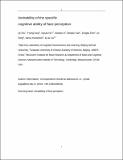Heritability of the Specific Cognitive Ability of Face Perception
Author(s)
Zhu, Qi; Song, Yiying; Hu, Siyuan; Li, Xiaobai; Tian, Moqian; Zhen, Zonglei; Dong, Qi; Kanwisher, Nancy; Liu, Jia; ... Show more Show less
DownloadKanwisher1.pdf (372.7Kb)
OPEN_ACCESS_POLICY
Open Access Policy
Creative Commons Attribution-Noncommercial-Share Alike
Terms of use
Metadata
Show full item recordAbstract
What makes one person socially insightful but mathematically challenged, and another musically gifted yet devoid of a sense of direction? Individual differences in general cognitive ability are thought to be mediated by “generalist genes” that affect many cognitive abilities similarly without specific genetic influences on particular cognitive abilities [1]. In contrast, we present here evidence for cognitive “specialist genes”: monozygotic twins are more similar than dizygotic twins in the specific cognitive ability of face perception. Each of three measures of face-specific processing was heritable, i.e., more correlated in monozygotic than dizygotic twins: face-specific recognition ability, the face-inversion effect [2], and the composite-face effect [3]. Crucially, this effect is due to the heritability of face processing in particular, not to a more general aspect of cognition such as IQ or global attention. Thus, individual differences in at least one specific mental talent are independently heritable. This finding raises the question of what other specific cognitive abilities are independently heritable and may elucidate the mechanisms by which heritable disorders like dyslexia and autism can have highly uneven cognitive profiles in which some mental processes can be selectively impaired while others remain unaffected or even selectively enhanced.
Date issued
2010-01Department
Massachusetts Institute of Technology. Department of Brain and Cognitive Sciences; McGovern Institute for Brain Research at MITJournal
Current Biology
Publisher
Elsevier Ltd.
Citation
Zhu, Qi et al. “Heritability of the Specific Cognitive Ability of Face Perception.” Current Biology 20.2 (2010): 137–142.
Version: Author's final manuscript
ISSN
0960-9822